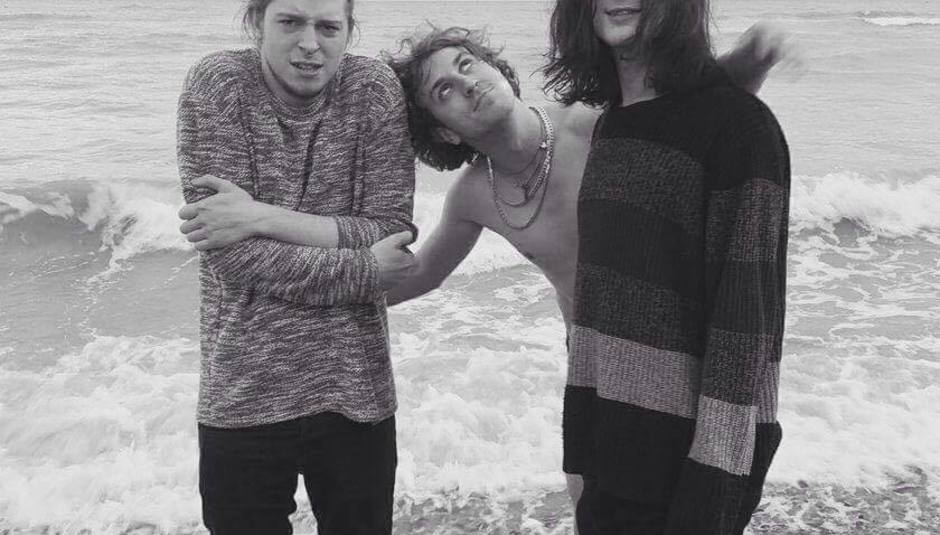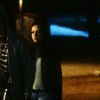Nottingham trio Crosa Rosa have been creating a holy racket around the city since bursting onto the scene in the early part of 2014. The three-piece - Joe Weatherall (vocals/guitar), Joe Fisher (bass) and Kegan Clark (drums) - make music that's indebted to both the halcyon days of Sub Pop and the 21st-century evolution of psychedelic rock, yet executed in a style all of their own.
Debut EP Pantophobia was released in the summer of 2015, and since then they've put out a couple of singles ('Simper Smiler' and 'Like A Lady') before most recent EP Candy Eyes dropped in November. Having earned themselves a reputation as one of the most exciting young bands in the city, they're gearing themselves up to take the rest of the UK by storm in 2017.
DiS: The first time I saw Crosa Rosa was at the NUSIC Future Sound Of Nottingham final in June 2014. How long had the band been going at that point?
Joe Fisher: That was our third show! We'd played an open mic night and our college graduation ball. That was our next show.
How did the band get together?
JF: Joe (Weatherall) hated me in college but we were the two original members of the band.
Joe Weatherall: Crosa Rosa you were, but I had another band just before you joined. Pete Fletcher from Denizen Recordings had heard my solo stuff and he advised me to get a band together so I could play some live shows. So I got a band together and we practiced in First Love Studios. This would be early 2014. The other guys weren't really that committed so we never actually played any shows, but I knew I had to get a band together if I wanted my music to be heard. I knew Joe (Fisher) could play bass but he was also a loud-mouthed prick so I just thought he'd be a temporary stop-gap until someone better came along!
JF: He hated my guts. I used to call him Kurt Cobain because he had dyed blonde hair and wore a Nirvana t-shirt every day. Then one day we were in the smoking area and I mentioned something about the With The Lights Out boxset and he said, "Do you like Nirvana?" So we started talking and he wanted to get this clicking guitar sound and I told him to set a clock up on his computer and keep repeating it. And we carried on talking after that about bands and songs we'd done before. Then he said he was getting a band together and needed a bass player. So I said "I can play bass", and he went "No thanks!"
JW: That's exactly what happened! But then after the sudden realisation I desperately needed a bass player Joe was in.
How did Kegan (Clark, drummer) become involved?
JF: We had another drummer at this point but he was going away to University in London that summer. Kegan was actually there at that NUSIC gig but he was drumming for Georgie that evening. And I reversed into his dad's car!
JW: I knew him through a mutual friend and asked him if he wanted to join, but at the time he was really busy with the Georgie stuff. Then his dad turned round and said "Why did you turn that down? They're the perfect band for you." When we started being offered more shows I asked Kegan again and he finally joined.
Did any of your solo material eventually get recorded as a band?
JW: No, it's completely different to anything I've done with Crosa Rosa. I'd write both separately; some songs for the solo record and others for the band if I could get one together. So a song like 'Turn Me Around', which is really old and predates Crosa Rosa, was always intended to be written for a band. The solo stuff is more electronic based.
You've written a lot of songs in such a short space of time. How do you decide which ones to record and when to release them?
JF: We have a big fucking argument!
Kegan Clark: It's more passive/aggressive!
JF: We tend to agree if we're in doubt about a new song Joe's written.
KC: It's a good relationship because when Joe brings his demos and we don't think it's good song, we'll just tell him and it normally ends up all three of us agreeing.
2016 will be remembered as being a year of political and social upheaval. Do you see it influencing the way you write in the future?
JF: Definitely. The song 'Baya' off the new EP is about the current political agenda towards our generation. Me and Kegan only just got out of Uni and a year later we're classed as proper citizens. Eligible to vote, pay council tax and all that.
JW: 'Baya' is about politicians that are forever putting the younger generation down. Misrepresenting us. In fact, not even that. Not listening to us. It's crept into a few songs I've written recently so maybe it will have a big influence in the future. We are the victims of their politics. Everything they represent.
KC: The politics in the world at the minute don't really concern us because we've got our own problems too close to home. So we feel the need to write about that instead. People that are in a better position than us - those in the lower/middle class bracket - they have to worry about politics because it affects them financially. We worry about food, rent, phone bills, survival. We know it's going to be more prominent for us when we get older but it's difficult to focus on that now.
JW: I don't see it like that all the time. Some of the songs I write are a way of escaping from reality. Not necessarily fiction, but at the same time they have no specific reference to anything that's going on in the world either. A lot of the songs people might perceive as being political actually aren't. 'Like A Lady' for example.
There was a bit of a furore on Tumblr when the video was released. What is the song about?
JF: Vice asked us for an interview to explain ourselves. Basically, the video has us dressed as ladies and it did the rounds on Tumblr.
KC: It was nothing more than a tongue in cheek stereotypical representation of what a 1950s lady was. We were dressed like the Queen Mum. It was harmless, especially in the context of the song.
JF* There's a lot of people on Tumblr like our stuff, and if one person shares it a lot of people end up seeing it and some of those have very extreme views. And sometimes those views aren't necessarily in favour of minority groups such as the LGBT community. So when someone accuses us of belittling that community by dressing up in women's clothes it can spiral out of control, and it almost did. We had a lot of supportive messages from the transgender community saying they enjoyed the video and didn't see what all the fuss was about.
KC: The song is actually about Joe (Weatherall)'s girlfriend having cancer, yet some people were trying to portray the lyrics as being misogynistic.
JW: I was having a really shit time when I wrote that song. My girlfriend had just been diagnosed with cancer and that's how I dealt with it.
JF: When I first read the lyrics I thought it was about a woman in a relationship being condescended to by a man. It was a statement in itself. It trended on Facebook. 55,000 people! It gathered so much momentum and even when we thought it was going to stop it just continued.
JW: Because she was going through so much pain I was too. I was trying to make light of the situation because the whole time everyone was being so serious. We had to stop concentrating on being a band and concentrate on seeing each other as friends instead.
JF: We see bands that have no camaraderie whatsover, whereas we've become best mates so when we saw he was going through a shit time we stopped making music for a bit.
KC: We did try and stick with gigging because it helped us get through a very difficult time. But ultimately we were focused on Joe and his girlfriend.
JF: Bands need to realise everything doesn't always have to be about gig, gig, gig. If you have shit going on in your life, you should just take some time off. You can't afford to get in a rut because that's how other problems manifest themselves and escalate. An important part about being in this band is knowing I have two best mates that love everything I do. That are willing to get in a dirty van and travel anywhere and everywhere. Stay three in a bed if we have to and spend our collective last pennies trying to make this band succeed. That's why it's more important to concentrate on the friendships within the band than anything else. We realised how much that meant to us when we went on tour with Purson last March.
What are your plans for 2017?
JF: We want to get on more festival line-ups this year. Just tour more in general. We've got lots of new material that we're releasing on vinyl. Fred Perry put us on their best of 2016 playlist so we're hoping something comes from that.
JW: It's good to have appreciation from other sources outside of the city.
JF: We need a manager.
JW: We need a booking agent...
JF: Yeah but we're struggling to get one without the other. We've spoken to potential managers who've said they like the songs but what the fuck is the production about? And we've spoken to agents who also like the live show but won't touch us until we get a manager. It's Catch 22. That's why we've been doing some recordings at The Grain Studios in Newcastle with John Martindale who recorded The Pale White.
JW: We literally scraped together every penny we had.
JF: They gave us a big discount but it still cost £400 for two days.
Do you think having a manager is important for new bands trying to break through?
JW: If we want to get to the next level it is. We've gone as far as we can without a manager. We don't want to have to start again.
JF: We've played headline shows to four people in places like Manchester and we don't want to do that again. We know social media and word of mouth is important for spreading our name, but it feels like we've hit a brick wall. That's why a good manager and god booking agent are so important for us. We'd love to get on a good support tour with a like-minded band.
JW: I guess it does raise the question of whether we're staying underground or trying to aim for the commercial market? Personally, I see this band as being straight down the middle but I'm not entirely sure how that works. I'd like us to aim for something like Cage The Elephant's Melophobia in the future as I think that occupies the middle ground between underground and mainstream.
That's not necessarily a bad move.
JF: It might cause confusion. We recently spoke to a guy from Ignition and he said he could see our band going one of two ways. Either heavier and more underground like The Wytches or Thee Oh Sees, or into a similar punk-pop territory as Catfish And The Bottlemen. Not necessarily the band's style but production wise. At the end of the day, we write pop songs so they're easily transferable if the production's cleaner and vice versa.
JW: I think we'd lose our edge if the sound became too commercial. There's nothing wrong with giving it a go, but I'm not sure it's really what we're about.
You've already had a bad experience with a previous management company?
JF: We have. We were building a reputation quite nicely as a solid live band but they blocked a lot of good opportunities for us. They wanted us to only play shows they'd organised, even when we were being offered really good gigs, or meet with labels they'd arranged rather than anything we did off our own backs. It got very frustrating so we mutually agreed to part ways. Fortunately Anton (Lockwood) from DHP saved the day by offering us some great shows. His favourite band is Clutch and when he found out they were one of ours too he offered us a support slot straight away. He's also given us a lot of good advice about the music industry and what to expect. Even though we've been together for nearly three years we're still a young band.
You're based in Nottingham at the moment but do you see yourselves staying here long term?
JF: No. You can't stay in one place forever. Being the biggest band in your hometown is like being the biggest chair in your living room.
KC: I don't know. When you come from a city with a vibrant music scene I think you should keep putting something back into it.
JW: I'd only relocate if it was really necessary and at the moment I don't see any reason why we would. Nottingham's a great city.
Tell us something about Crosa Rosa most people might not be aware of?
JW: I also make guitar pedals at home. It goes back to when we met Oliver Ackermann from A Place To Bury Strangers at the Bodega last year. I remember telling him the Fuzz War pedal was good and he said, "Yeah man, you should buy it!" and we carried on talking about Death By Audio after that which inspired me to start making my own.
What advice would you give to new bands just starting out?
KC: Get on BBC Introducing as early as you can.
JW: Use the tools you're given and use them well.
KC: A friend in need is a friend indeed.
JF: Whatever you've got abuse it! We've made a lot of contacts just through gigging.
For more information on Crosa Rosa visit their Bandcamp, Facebook and Soundcloud pages.






















